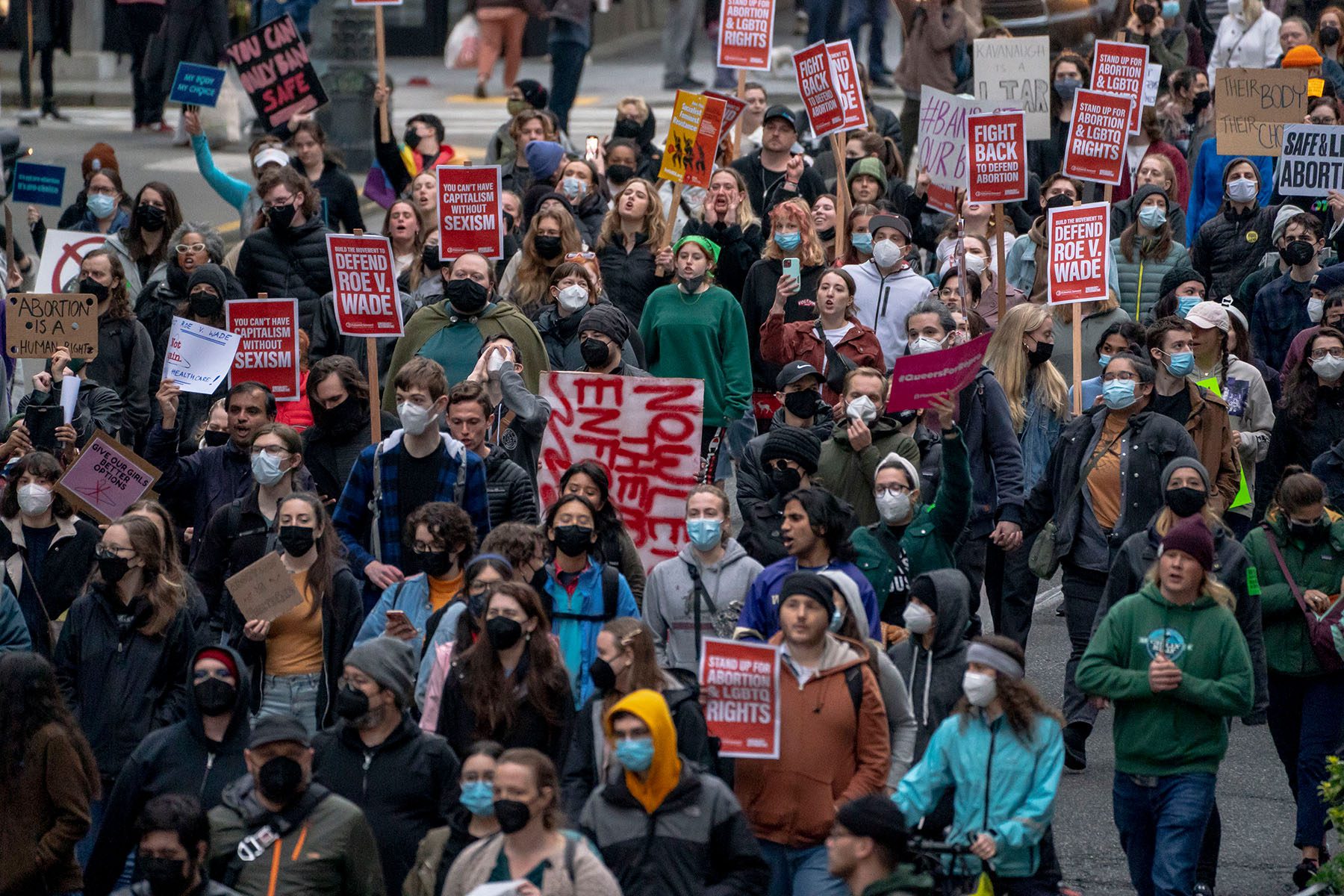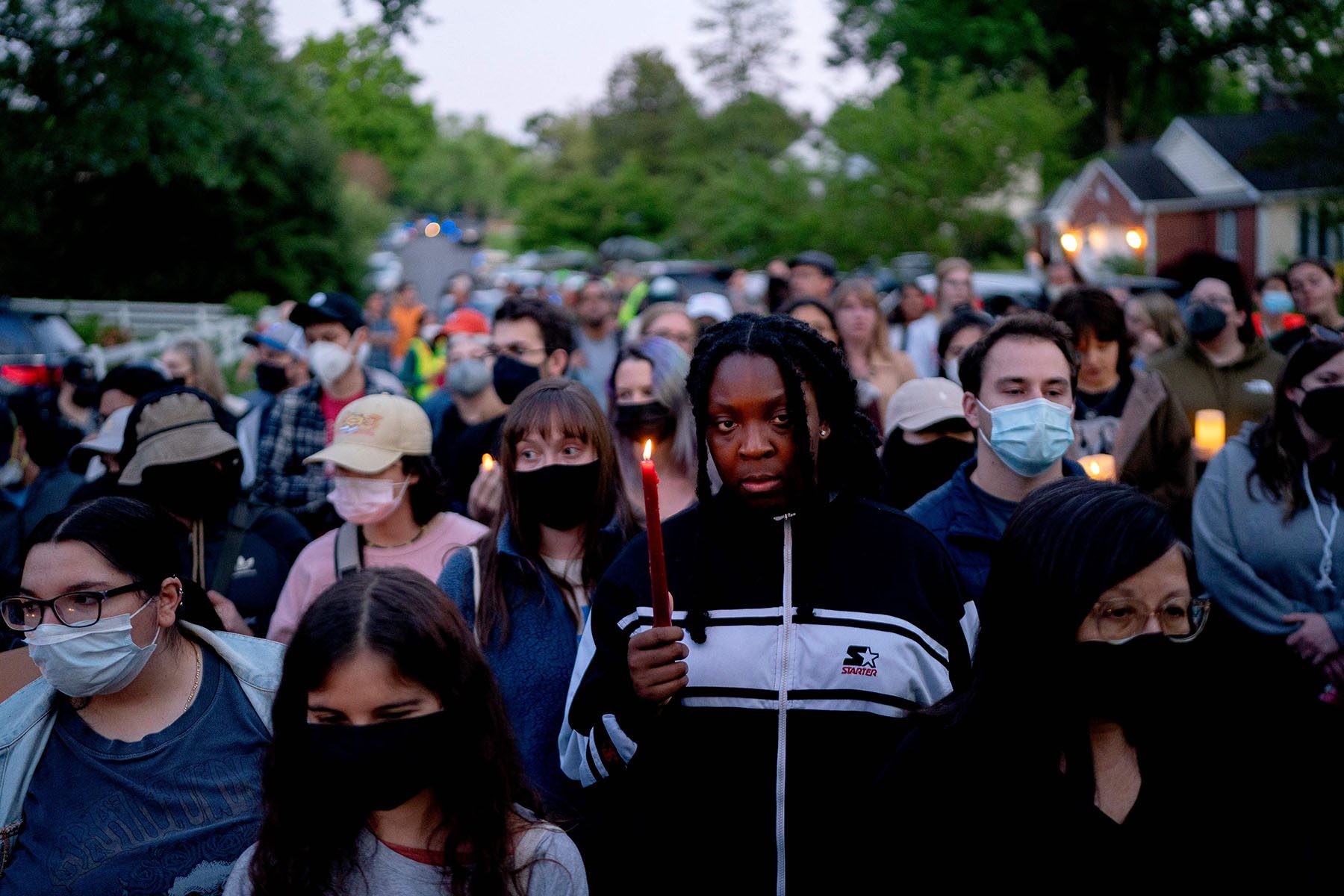From the moment the draft opinion leaked, people — many of them women — began gathering on the steps of the high court and in cities across America. Some voiced their outrage at the end of a precedent that lasted generations; others celebrated a judicial victory half a century in the making.
Supreme Court Justice Samuel Alito’s opinion, which is not final but appears likely to overturn the landmark 1973 Roe v. Wade decision, leaked almost two weeks ago. This weekend, people who support abortion rights — women, LGBTQ+ people and others energized by the issue — are expected to gather again, at rallies in support of abortion access across the country, from New York to Austin to Los Angeles.
While it is unclear how many will attend, organizers including Planned Parenthood, Women’s March, the ACLU, NARAL Pro-Choice America and the Service Employees International Union say they have heard from hundreds of thousands of people who have signed up to show up for more than 370 nationwide actions on Saturday. What is clear is that something has been unleashed in the last two weeks, largely centered within American women: a raw fury and growing fear as the realities of a post-Roe society begin to set in.
I have been thinking about how — or whether — that emotion will be harnessed in the weeks leading up to the official ruling on Dobbs v. Jackson Women’s Health, as trigger laws begin to take effect in dozens of states and as we head into the midterm elections this fall.
I was among a group of journalists on a call Thursday with Vice President Kamala Harris, who has used her position as the second-most powerful person in the country to declare that “women’s rights are under attack” with the assumed Dobbs outcome.
“This is going to be a stark reality for so many people,” said Harris, who continued to frame the fight for Democrats as an issue of freedom, rights and privacy for every American.
“I do believe we should be thinking and talking about progress and the trajectory of a nation that prides itself on being a democracy,” the vice president continued. “This has the potential to deprive women of rights, which is not in the interest of anyone in our country, regardless of gender.”
For the millions of women now awakening to the prospect of losing federal protection of abortion, will their protest turn into power? I wanted to talk to people who are trying to galvanize Americans who support abortion rights and channel their anger into action, particularly at the ballot box.
Cecile Richards, former president of Planned Parenthood and co-founder of Democratic organizing group Supermajority, said she plans to join the rally in Austin on Saturday and predicts that this weekend will be an important one.
“We’re beginning to see this dawning realization by folks, a sense that this is real now,” Richards said. “The question over these next few weeks and months is, how does this manifest itself? Is it going to take place in the public square, where even if there’s no immediate solution, it’s a demonstration of how outraged people are? For better or worse, there’s now a big lead-up to this Supreme Court announcement. It’s going to be a much bigger moment than I think anyone could’ve anticipated.”
For months ahead of the expected Dobbs decision, Planned Parenthood president Alexis McGill Johnson said, the organization had been working to overcome the “believability gap” — the idea that people didn’t believe the court was poised to overturn Roe. The gap has now closed with the leak of the draft opinion, she said.
McGill Johnson said she’ll be at the rally in Los Angeles, where more than 100,000 people have indicated they’ll show up. There, she said, “they will literally get their marching orders.”

“They’re signing up because they want to be deployed,” said McGill Johnson, adding that Planned Parenthood is working to continue to identify key races in the midterms at the federal and state levels, as well as ballot initiatives they plan to target in the months ahead.
Similar campaigns to mobilize abortion rights supporters are underway around the day of the Supreme Court decision — sometime in June or July — and as states begin implementing laws triggered by the ruling. The organization’s goal is to build an infrastructure that sustains the momentum from these rallies. Polling shows that details vary but that the majority of Americans don’t want Roe overturned.
Elected officials “move because they see where the people are, the visibility of where public opinion is,” McGill Johnson said. “They know those bodies are literally going to hold them accountable. We’re looking at this in terms of how you channel this into real concrete wins that protect access.”
In recent years, such actions have translated into political power. The 2017 Women’s March, the largest single-day protest in history, was born out of the 2016 presidential election, when Donald Trump defeated Hillary Clinton and disbelief turned into despair and then action for millions of women.
Then came the confirmation hearing for Supreme Court Justice Brett Kavanaugh in 2018. Testimony from Christine Blasey Ford, who accused him of sexual assault, fueled an anger among many women from Capitol Hill to the ballot box. Women voters helped propel the Democratic Party’s gains in the midterm elections, ushering in a record number of women who would help to make up the most diverse Congress in history.
Trump’s nomination of Amy Coney Barrett to succeed Ruth Bader Ginsburg on the Supreme Court, weeks before the 2020 election, also galvanized millions of women — again, first to protest and then to the polls. They again were a key part of the Democratic Party’s victory, helping put Joe Biden and Harris in the White House.
In all of those cases, protest was a first place to process for many women. The next step, for organizers and for Democrats, is to mobilize voters, craft a message and stand up candidates to translate activism into political action.
As state bans begin to take effect, women’s awareness, anger and anxiety will only continue to build, Richards predicted.
“It’s not going to be this one moment,” she said. “This is more like the rolling thunder, a much more insidious realization that things are not okay.”
Amanda Brown Lierman, who succeeded Richards as executive director of Supermajority last year, organized a Mother’s Day rally in Washington last weekend, drawing 300 women to the steps of the Supreme Court. That action, she said, helped people find community immediately after the leak, as she and others began to strategize about the way forward.
Now, Brown Lierman said, the goal for organizers like her is to take the rage to a place where people can exert their power, from marching and rallying to voting.
“We treated Roe like the ceiling when it should’ve been the floor,” Brown Lierman said. “I would hate for people to take this moment of despair and not remember the opportunity and urgency of this fall.”
She recalled the group’s 2020 campaign after the death of Ginsburg, when Supermajority launched “Women Are Voting.” They’re relaunching the campaign this year, encouraging women to vote via advertising and organizing, particularly on the ground in Michigan and Pennsylvania.
Brown Lierman said she plans to attend the Washington rally this weekend, in part as a reminder that abortion is still legal nationwide and to help educate people who may not understand the implications of the draft ruling or what could be coming once a final decision is announced.
Asked whether she plans to attend this weekend’s rallies, Harris demurred but said she will remain engaged on the issues and is “in touch” with organizers, adding that the message will probably evolve as the landscape shifts from pre-decision to post-decision.
What happens next will be not just a matter of goodwill but of good organizing, Richards said. She recalled the huge turnout for the 2017 marches.
“You don’t get 4 million people to a march without a lot of people talking to their sisters, talking to their friends, ordering the parade permits,” she said. They are “pointing people in a direction and saying, ‘If you want to be part of the fight back, here’s where to be.’”







